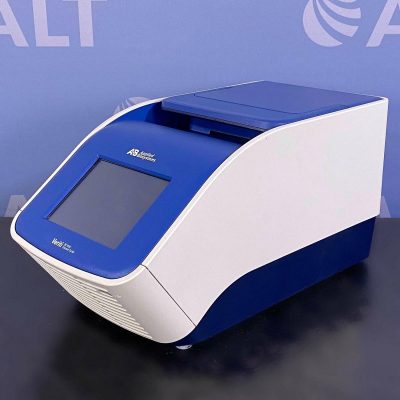PCR Gradient Thermocycler (ABI)

Description
A PCR (Polymerase Chain Reaction) gradient thermocycler is a specialized instrument designed for amplifying DNA sequences. It allows for simultaneous testing of multiple annealing temperatures, optimizing PCR conditions for various samples.
Features of a Good PCR Gradient Thermocycler
1. Gradient Capability
– Ability to set a temperature gradient across a block (e.g., 4°C to 100°C) to optimize annealing conditions.
2. Accuracy and Precision
– High precision in temperature control, typically ±0.5°C to ensure reproducibility.
3. Multiple Sample Capacity
– Configurations to accommodate various plate formats (e.g., 96-well, 384-well).
4. User-Friendly Interface
– Intuitive touchscreen or software for easy programming and tracking.
5. Fast Heating and Cooling
– Quick thermocycling to reduce overall run times, with ramp rates generally around 3°C to 5°C per second.
6. Data Logging
– Options for storing protocols and reviewing temperature profiles post-experiment.
7.Flexible Programming Options
– Supports various PCR protocols, including steps for denaturation, annealing, and extension.
Brand: Applied Biosystems – Veriti™ 96-Well Thermal Cycler
Technical Specifications
– Temperature Range: 4°C to 100°C
– Temperature Gradient Range: 30°C across the block
– Block Formats: 96-well, compatible with various PCR plates and tubes
– Heating Rate: 3°C to 5°C per second
– Cooling Rate: Adjustable settings for rapid cooling
– User Interface: 7-inch color touchscreen with intuitive programming
– Data Storage: Up to 1000 protocols
– Weight: Approximately 15 kg
– Power Supply: 100-240 V AC, suitable for global use
PCR gradient thermocyclers are vital in molecular biology labs for optimizing PCR conditions, ensuring successful DNA amplification for downstream applications.
